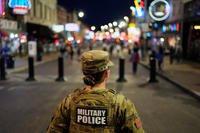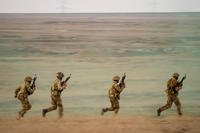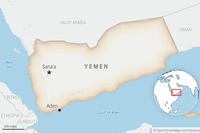As the Trump administration lines up ever more countries to accept deported immigrants, a report to be released Thursday documents Washington has more extensive ties than previously known to migrants sent to a notorious prison in El Salvador, the U.S. detention camp in Guantánamo Bay and South Sudan.
The report, written by the University of Washington Center for Human Rights, says documents obtained through public disclosure laws appear to show the federal government expelled 14 immigrants with Washington connections to those locations. They lived in the state, were held at the Northwest ICE Processing Center in Tacoma, began their deportation journey on chartered flights out of Boeing Field or were expelled via a commercial flight from Seattle-Tacoma International Airport.
Seven went to the Terrorism Confinement Center in El Salvador, known as CECOT, six to Guantánamo Bay and one to South Sudan.
The UW center, which has issued numerous research reports critical of immigration enforcement, traced deportation paths, pointing to local agencies and companies involved in some way. "This report is intended as much as a denunciation of the documented cases as a plea for transparency and a cessation of collaboration from our state and local institutions," it reads.
The migrants with Washington ties who were sent to the El Salvador prison were all men from Venezuela deported in March, according to the report. The UW center has not been able to confirm whether the seven were eventually returned to Venezuela in a July prisoner swap.
Others who were part of the swap have said in media interviews they were subject to torture, including beatings and sexual abuse.
Some migrants deported from around the country to Guantánamo Bay, located in Cuba and serving as a way station to other destinations, have said they too were mistreated.
In addition to grim conditions, immigrants deported to Guantánamo Bay or so-called third countries," where they have no affiliation, have at times remained incommunicado, their whereabouts unknown to lawyers and family members, according to the UW center's report, international human rights groups, litigation and media accounts.
"We are now seeing abuses of such gravity that they constitute gross human rights violations," the report says. It cites national and international laws and treaties that condemn sending people to places where they are likely to face grave danger. The report also refers to a United Nations convention that calls for an end to what it calls "enforced disappearances," or the practice of imprisoning people while concealing their fate.
Homeland Security Assistant Secretary Tricia McLaughlin denied migrants at Guantánamo Bay were beaten, and said they were able to call lawyers. In emailed statements, she did not address allegations of torture at CECOT and referred questions about conditions there to El Salvadoran government.
She offered no information about eight migrants sent to South Sudan, including Tuan Thanh Phan, a Vietnamese refugee who came here legally, grew up in Tacoma and served a 25-year sentence for first-degree murder and second-degree assault.
He and the seven others, who left the U.S. in May, were held in a converted shipping container in a U.S. military base in Djibouti during legal wrangling. The U.S. Supreme Court cleared the way for their deportation to South Sudan in July.
Little has been known about the eight men since they arrived there. Phan spoke to his wife briefly for the first time last week, according to Matt Adams, legal director of Northwest Immigrant Rights Project. The nonprofit has represented Phan and is one of several organizations pursuing a class-action lawsuit over third country deportations.
"As I understand it, he's locked in his room each night but he does have his own room," Adams said. The room does not seem to be in a prison but is located on a compound that has one, he said. "There's still no information about what the future has in store."
McLaughlin offered no insights beyond saying: "If you come to our country illegally and break our laws, you could end up in CECOT, Guantánamo Bay, or South Sudan or another third country."
Naming Those Deported with Washington Ties
The UW center pieced together which deported immigrants had Washington ties over several months. It used an array of government documents as well as flight tracking information made public by the county and an activist group called Witness at the Border.
Some local connections were already known. The Seattle Times and other media outlets had already reported on the cases of Phan and José Medina Andrade, a onetime Seattle-area resident and Venezuelan national sent to Guantánamo Bay. From there, he was sent back to Venezuela, where he felt unsafe due to gang activity, and left for another country, according to migrant activist Kasandra Seda.
The UW center discerned new Washington ties from cross-referencing government databases and media reports, such as ProPublica profiles of 238 men sent to El Salvador's CECOT.
Phil Neff, the UW center's research coordinator, said apparent inaccuracies in some of the ICE data leave room for doubt in a few cases of people purportedly sent to Guantánamo Bay.
Of the 14 cases the UW center tracked, it names nine, including all seven sent to CECOT: Wladimir Vera Villamizar, Yuber Moron Cabrera, Alirio Guillermo Belloso Fuenmayor, Nery Suárez-Salas, Robinson Saavedra-Caruci, Maikel Moreno-Ramirez and Kenlyn Rafael Rodríguez Rojas.
Three lived in Washington before being detained.
Villamizar, a welder who moved to Seattle last year, was detained at a January ICE check-in weeks after an emergency surgery to remove a lung scarred by tuberculosis, according to the UW report and an interview with his family by NBC News. He had been incarcerated for seven years in Venezuela for murder, according to McLaughlin of Homeland Security. His mother told NBC News he had been falsely accused.
McLaughlin said Villamizar was a member of Venezuela's violent Tren de Aragua gang, an accusation the U.S. has leveled at many Venezuelan immigrants it has deported. Villamizar's mother said he was not a gang member.
ICE in January also arrested Moron Cabrera in Washington, according to the UW report. A former member of the Venezuelan military, Moron Cabrera moved to the state last summer and worked as a bricklayer and delivery driver, according to ProPublica.
Rodríguez Rojas, a Venezuelan national, entered the U.S. in 2023 and sometime after moved to Washington, where he worked as a delivery driver, according to the organization Robert F. Kennedy Human Rights, named after the assassinated U.S. senator. ICE arrested Rodríguez Rojas in January in New York. The UW Center said it does not know if he moved there or was traveling.
Venezuelan records show Rodríguez Rojas was arrested in February 2010 and charged with aggravated vehicle robbery, illegal firearm possession and use of a minor in a crime, ProPublica reported. The case was dismissed.
Role of Boeing Field and Sea-Tac
The UW center doesn't just excoriate the federal government for alleged human rights abuses. It also strongly criticizes local institutions for their roles in immigration enforcement. That includes the state Department of Corrections, which releases people into Immigration and Customs Enforcement custody, and King County, which runs Boeing Field, used by ICE for chartered deportation flights.
The report also calls attention to ICE's practice of deporting people using commercial airlines, including Alaska Airlines and a dozen others operating out of Seattle-Tacoma International Airport. This past January and February, the only months for which the UW center has complete records relating to local deportations, 104 of 322 expelled individuals left on commercial flights from Sea-Tac airport, according to the report. The rest left via Boeing Field, except 8 driven into Canada.
King County banned ICE from using Boeing Field in 2019 and was forced to backtrack four years later after a federal court ruled the local government overstepped its authority. The county is not the only local government to face backlash from the federal government over limits they have placed on involvement with immigration enforcement.
The state's 2019 Keep Washington Working Act prohibits most local agencies from cooperating with immigration authorities, with the exception of the corrections department. As a result, the state stands to lose millions of dollars in federal funding and received a recent warning letter from U.S. Attorney General Pam Bondi that further sanctions could be on the way.
Angelina Snodgrass Godoy, the UW center's director, acknowledged in an interview this week she doesn't necessarily know what else local institutions could do. "We have to explore what tools there are available, or create new tools such that a family is not left with this horrible not knowing if their loved one is alive or dead days after he was last heard from in U.S. government custody."
Despite constraints, Godoy said, local governments could be more transparent about their role and steps they are or aren't taking to look into alleged human rights violations.
The county, for instance, pledged to make public a record of ICE flights leaving from Boeing Field, but on its website lists only a fraction of such flights tracked by Witness at the Border, according to her center's report.
The county publishes all the information it has but "communication with ICE is inconsistent and without their coordination, our team does not have the staff capacity to track down and verify every detail of flight activity," said spokesperson Amy Enbysk.
On chartered ICE Air flights out of Boeing Field, migrants are put in handcuffs, belly chains and leg irons. Those in ICE custody appear to be treated much better on commercial flights. Alaska Airlines, for instance, doesn't allow leg irons, according to airline spokesperson Tricia Bruckbauer. United Airlines, identified in the report as transporting deported individuals, declined to comment and Delta Air Lines, also named, did not respond to questions.
Albert Khamitov, a formerly detained Russian immigrant was transferred several times to different facilities around the U.S. by ICE. One transfer, from the Seattle area to Alaska in June, was on a military plane that had no seats or bathrooms, he said.
Khamitov said in an interview this week he considered himself lucky to be flown on a commercial flight back to Seattle. He and three other detained individuals on the flight, accompanied by two polite ICE officers, were handcuffed and given hoodies to hide the restraints, he said. Otherwise, they were treated like regular passengers, served drinks and snacks like everyone else.
Asked whether an attempt to stop deportations using commercial airlines at Sea-Tac airport could result in worse conditions for migrants, Godoy said it was a good question to ask. Still, she said, it is important to understand all paths used for deportations. She met with the Port of Seattle Monday to discuss the report's findings.
"We are heartbroken to learn about the number of families whose loved ones have been torn from them," the Port said in a statement, which added it welcomed the opportunity to collaborate with Godoy on potential steps to "support our community on this critical issue."
However, the statement said, the government agency is not made aware of deportations happening on commercial flights and "cannot intervene in immigration enforcement at any level."
A State Agency with an ICE Liaison
Of all the local agencies identified in the UW center's report, the corrections department has the clearest involvement with ICE.
"State government cannot dictate to the federal government how it enforces federal law," Gov. Bob Ferguson added in an email.
In an emailed statement, Gov. Bob Ferguson noted he is standing by Washington's 2019 sanctuary law, including the corrections department carveout. "There must be a balance," he said. More than 60% of individuals in state prisons wanted by ICE have been convicted of rape or murder, according to the governor.
The corrections department, as the UW report notes and department Secretary Tim Lang confirmed in an interview, employs an "ICE liaison" and shares information with the federal agency about who is in its prisons and when people wanted by immigration authorities will be released. ICE, if it chooses, then goes to the relevant prison to pick up those individuals.
The corrections department released Phan into ICE custody in March, spokesperson Chris Wright confirmed. He was one of 51 individuals the department turned over to ICE this year through mid-July. Last year, the agency released 101 to ICE.
As the UW center's report reveals, ICE also shares information with the corrections department. Lang said the state agency needs to know the whereabouts of people who have community supervision requirements, like checking in with a corrections officer, as part of their sentences. If they're detained, they can't fulfill those requirements and, if they're released, those requirements still have to be met.
In February, ICE let the corrections department know an individual was at the detention center in Tacoma and might be moved to Guantánamo Bay, according to an email cited in the report from the department's ICE liaison to colleagues. "He is from Venezuela a points of interests for ICE (sic)," the email said.
That person did not end up being deported to Guantánamo Bay, as far as the UW center could see from ICE records.
Even if the individual or others released into ICE custody had been sent there, it was not the corrections department's business, Lang said. "The things that happen once we hand them off are not within our control," the corrections secretary said.
Lang added he was aware of lawsuits challenging deportations to third countries and Guantánamo Bay. That litigation, he said, "seems like the appropriate forum for decisions about whether such deportations are lawful.
© 2025 The Seattle Times.
Visit www.seattletimes.com.
Distributed by Tribune Content Agency, LLC.













